This last month has been notable for its rainfall which we hope will signal the beginning of the end to the prolonged drought affecting much of southern England. Precipitation was very evident when the Group joined the Professional Horticulture Group South West to visit two small nurseries in Gloucestershire with very different business strategies reported on below.
May sees the closing date for entries to be submitted for the David Miller Travel Bursary Award. Applications for this award can be made up to 14 May.
On 15 May we will again be joining the Professional Horticulture Group South West in Dorset for a visit to Country Garden Plant Sales, a wholesale nursery specialising in ferns and grape vines followed by a study tour of plant management at the RSPB Arne Nature Reserve. Details
May 18 has been designated 'Fascination of Plants Day 2012'. Numerous events have been planned on the day and in the days around. As our contribution we have organised a visit to Thanet Earth, the largest greenhouse complex in the UK, on 16 May.
Editor
Contrasting collectors
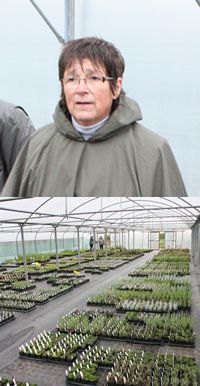
The McVicars started selling wholesale to customers including Fortnum & Mason and Homebase. A foray into organic tomatoes sold through supermarkets was short-lived, as was growing organic herbs for Waitrose. The couple decided they were more interested in the collection of herbs, their botany and ethnobotany, so instead concentrated on mail order supported by major promotions at the Chelsea Flower Show.
Even this was somewhat accidental. The hot summer of 1991 left them with lots of unsold stock and someone suggested they used these to exhibit at an RHS show. They did so at an October show and won a Silver Medal. They were then 'persuaded' by Mavis Sweetingham, in her usual forceful manner, to do Chelsea. Sixty three Gold Medals later she decided to give up exhibiting and the mail order and concentrate on the collection.
However, Jekka remains interested in how the shows are developing and feels they need to change. Attendance is falling and she feels there should be a greater concentration on plant booths for selling plants at the shows.
Jekka now uses her Chelsea experience to grow herbs for other exhibitors as well as helping other gardens such as Le Manoir to develop their herb collections.
We were shown round a tidy and well-organised nursery (pictured above). Both indoor and outdoor areas are covered by heavy-duty groundcover, essential for weed control as the nursery is entirely organic. Jekka regards this as a basic principle she will not change although we were not treated to the reason why.
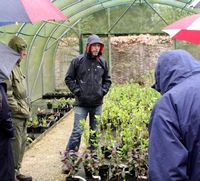
As a collector he is very keen not just in obtaining new plants but carefully recording and keeping track of where the plants came from. His collecting expeditions cover all parts of the globe in search of new hardy or semi-hardy species. He will collect anything that looks interesting and has a wide range of trees, shrubs and herbaceous plants. A particular focus of his collecting has been limes (Tilia) and birch (Betula) species and he has a good collection of the latter with special emphasis on their bark colouration from pure white to dark purple.
Nick does not protect his acquisitions with Plant Variety Rights (PVR), indeed made it clear he was opposed to this on principle. This provoked some discussion on the merits of PVR and the ability to collect royalties verses the high cost of obtaining, marketing and protecting the rights. It is probably fair to say that the majority of species that Nick collects will always be aimed at a relatively small market and will never justify the expense. The trick as ever is spotting the one species that might become a mainstay of the landscape and garden centre trade.
Plant of the Month
Trillium undulatum, painted trillium, wake robin, birthroot, Melanthiaceae
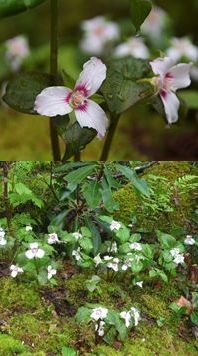
The name trillium comes from the Latin tri meaning three or triple - for the leaves and other flower parts which are in threes. Undulatum means wavy and indeed this species has wavy edged petals. It is found across the whole of the eastern portion of North America, except in Florida but is locally threatened or endangered. It grows best in strongly acidic, humus rich soils and is found in the shade of the native conifers and broadleaf trees.
The seeds of this species (as well as many other trilliums and spring wildflowers in Eastern North America) are dispersed by ants. The seeds have an elaiosome attached that is usually rich in lipids. Ants move the seed by grasping the elaiosome and then carry or drag the seed to their nest. Having fed the fatty body to the developing larvae in the nest the seed is then discarded in refuse piles. This strategy offers the plant some potential advantages - escape from predation and nutrient rich germination sites. There were certainly plenty of ants in evidence in the forests where the trilliums were growing.
If you'd like to see trilliums growing in their masses in the wild (as well as many other spring beauties), then I recommend a walking holiday in the Great Smoky Mountains in April. Heaven for all plantaholics!
Alison Foster
Oxford Botanic
Garden
Medicinal Plant of the Month
Podophyllum peltatum, mayapple, Berberidaceae
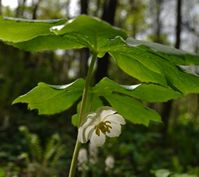
The botanical name is a contraction of anapodophyllum from the Latin anas meaning duck, podos (foot) and phyllon (leaf). Peltatum refers to the shield-shaped leaf - ie a leaf that is attached on the lower surface away from, and not at the margin of, the leaf.
This plant has long been used by the native Indians for various medicinal purposes. A resin called podophyllin is obtained from the rhizomes of this plant and this resin contains a substance called podophyllotoxin. This is used in combination with aspiring to treat plantar warts but also forms the basis of several anti-cancer drugs. Etoposide, teniposide and etoposide phosphate (Etopophos) are chemotherapeutic agents all derived from podophyllotoxin. Etoposide is used as a first-line treatment for small cell lung cancer and also to treat testicular cancer that has failed to respond to other drugs.
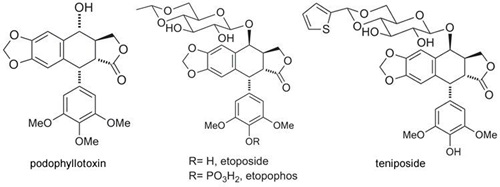
In addition to being isolated from the American mayapple, podophyllotoxin can also be isolated from Podophyllum hexandrum, the Himalayan mayapple. These plants are in the berberis family and other taxa in this family, including Diphylleia cymosa, also from North America, have been shown to produce podophyllotoxin.
Alison Foster
Oxford Botanic
Garden
Horticulture Industry News
For the very latest horticultural news follow us on Facebook and or
Twitter.
Terra Firma buys Garden Centre Group
Garden Centre Group, the owner of the Wyevale and Blooms brands, has agreed
to sell the business to Terra Firma, Guy Hand's private equity firm, in a
deal which values it at £276m. The Garden Centre Group has 129 centres
across England and Wales, a website and the largest gardening club in Britain
with over 2 million members. Andrew Sells, chairman of The Garden Centre Group,
said the sale follows the decision of shareholders to realise their investment.
Major shareholders Lloyds Banking Group and Sir Tom Hunter, the Scottish entrepreneur,
have taken a significant write-off in the deal. More
Identifying disease-carrying aphids
US Department of Agriculture (USDA) scientists have found a way to distinguish
aphids that spread plant viruses from those that do not. Not all aphids transmit
viruses, and spraying is expensive and can harm the environment, people and
animals. The researchers used protein biomarkers to differentiate between
virus-spreading and virus-free aphids. The findings mark the first time that
protein biomarkers have been linked to an insect's ability to transmit viruses. More
Organic control for cabbage flies
When cabbage root flies lay their eggs on freshly planted vegetables, organic
farmers often lose their entire crop. In the future, pellets made of cyanobacteria
and fermentation residues from biogas plants will repel these insects in an
ecologically compatible manner. If the pellets are placed around freshly planted
vegetables, the cyanobacteria are degraded by the soil flora and release a
scent that repels cabbage root flies. The nutrient-rich fermentation residues
additionally fertilise the plants. The pellets are easy to apply, and the
nutrients are directly available to the plants. More
Airborne wound signals induce antibacterial resistance in neighbouring
plants
Many plants release airborne volatile compounds in response to wounding due
to pathogenic assault. These compounds serve as plant defences and are involved
in plant signaling. In a study, the effects of pectin methylesterase (PME)-generated
methanol released from wounded plants ('emitters') were examined
on the defensive reactions of neighbouring 'receiver' plants.
Plant leaf wounding resulted in the synthesis of PME and a spike in methanol released into the air. Gaseous methanol from wounded PME-transgenic plants induced resistance to the bacterial pathogen Ralstonia solanacearum in the leaves of non-wounded neighboring 'receiver' plants. The data indicated that methanol emitted by a wounded plant acts as a signal that enhances the antibacterial resistance in neighbouring plants. More
Agent approved for UK fruitlet thinning
The thinning agent MaxCel has been approved for use by British apple growers,
in time for the current season. Developed and manufactured by Valent BioSciences
in the USA, it is distributed in Britain by Interfarm UK. According to Interfarm
MaxCel prevents fruitlets below a certain size from developing further, while
fruitlets above that size will grow on successfully. Expensive hand-thinning
costs are reduced and fruit size is increased. It also promotes strong blooming
the following year. Only one application is needed per season, but at temperatures
above 15° C. More
Positive start for British tomato season
The season has started positively for British tomato growers, with some harvesting
for supermarket customers three weeks early. Light levels are correlated to
tomato growth and they have been slightly better this year, and the mild weather
has meant growers haven't had to use so much heat. More
New Phytophthora disease identified in Upper Teesdale
Phytophthora austrocedrae is a species that was only described in
2007, although it is thought to have been present in Argentina and Chile for
at least 50 years. It is a damaging plant pathogen that was until recently
almost unknown in Britain. However, it has been confirmed in juniper bushes
at the Upper Teesdale National Nature Reserve (NNR) in the North Pennines
in 2011 in England, and in single specimens of Lawson cypress and Nootka cypress
trees at two sites in Scotland.
Record claimed for pea shoots harvest
Wiltshire farmer Dr Steve Rothwell claims to have harvested the country's
earliest ever crop of pea shoots. The shoots form part of the Vitacress-owned
Steve's Leaves range, which are washed in spring water and bagged in Hampshire.
Rothwell said he was in no hurry to harvest because the leaves are only taken
when they have attained their distinctive fresh-pea flavour. Meanwhile, British
asparagus, grown under polythene, has also hit supermarket shelves well ahead
of the season's traditional 23 April start date. Norfolk grower Andy Allen
says: 'We have begun to cut spears. The crop as a whole is slightly earlier
than usual, although the cold nights have stopped it getting too far ahead.' More
South African apple exports forecast to rise
South African apple exports have shown a 6% year-on-year rise from weeks 1
to 12, with growers expecting good quality and volumes this season. Overall
the season is expected to register a 4.4% year-on-year export rise with a
total of 332,937.5 metric tons (MT) in shipments. Hortgro is expanding its
current 'Beautiful country, beautiful fruit' campaign in British
supermarkets to Germany this season with the prospect of conducting similar
initiatives in the Middle and Far East. More
Small businesses take brunt of increased plant health inspection
charges
UK growers and importers will pay more for plant health inspections of fresh
produce and cut flowers with swingeing increases in fees and charges imposed
on 6 April 2012. The Fresh Produce Consortium (FPC) is demanding that Fera
immediately introduces efficiencies and reduces the frequency of checks on
reputable traders. Fera is set to phase in increases over two years in order
to reach full cost recovery. There will be significant increases in plant
passport fees, plant health licensing and services, seed potato certification
and import services for potatoes originating in Egypt.
Artemisinin-resistant malaria spreads
Artemisinin-resistant malaria has arisen in western Cambodia. A concerted
international effort is now underway to contain artemisinin-resistant Plasmodium
falciparum, but containment strategies are dependent on whether resistance
has emerged elsewhere. Recent studies have shown that genetically determined
artemisinin resistance in P falciparum emerged along the Thailand—Myanmar
border at least eight years ago and has since increased substantially. At this
rate of increase, resistance will reach rates reported in western Cambodia
in 2—6 years. More and More
Grower suffers 'historic losses'
Vegetable grower and supplier Produce World Group, which owns Marshalls in
Butterwick, have moved to reassure staff, suppliers and customers after posting
'historic losses' for 2010/11. The group says its losses were
a result of the difficult market conditions and cost incurred through restructuring
the business after it bought Marshalls. The costs were discovered after a
review of internal accounts and investigations confirmed there were errors
in the internal accounting procedures going back a number of years.
Continued expansion
Fruit and vegetable producer Fresh Approach Produce is continuing its investment
programme. A £250,000 investment has been made into leek packing. The company has
seen huge growth in this area and needed to increase capacity
to keep pace. The brand new state of the art facility is located right in
the middle of one of its main leek crops and allowed it to drive forward
in terms of volume, service and quality. Their next target is for a completely
new allium packing plant to handle a planned increase in production and crop.
The plans are well under way and onions has been one of its most successful
growth areas in the last two years.
A bit touchy: Plants' insect defenses activated by touch
A new study by Rice University scientists reveals that plants can use the
sense of touch to fight off fungal infections and insects. The study found
that plant defences are enhanced when plants are touched. From previous studies,
they knew that plants change their growth in response to touch but didn't
know how these growth changes were activated. They used Arabidopsis thaliana to test the idea that the touch-induced growth was regulated by a plant hormone
called jasmonate.
This plays a critical role in initiating plant defences against plant-eating
insects. When jasmonate levels go up, the plant increases production of metabolites
that give herbivores an upset stomach.
Jasmonate defences, which also protect
against some fungal infections, are employed by virtually all plants. The
new study provides the first evidence that these defences are triggered when
plants are touched. More
Red wine could help block fat cell formation
A compound found in red wine, grapes and other fruits, and similar in structure
to resveratrol, is able to block cellular processes that allow fat cells to
develop, opening a door to a potential method to control obesity. The compound
piceatannol blocks an immature fat cell's ability to develop and grow.
While similar in structure to resveratrol the compound that is thought to combat cancer, heart disease and neurodegenerative diseases, piceatannol might be an important weapon against obesity. Piceatannol alters the timing of gene expressions, gene functions and insulin action during adipogenesis, the process in which early stage fat cells become mature fat cells. More
News from our Associates
Society
of Biology

eEvents Calendar
Society
of Biology AGM
3 May, Society of Biology
London, UK
Desert Green
7 - 9 May, Unido, UNDP, FAO
Qatar
Plasticulture
for a Green Planet
15 - 17 May, International Society for Horticultural Science
Tel Aviv, Israel
Harnessing
Emerging Technologies for Environmental Science
16 May, Environmental Virtual Observatory
London, UK
International
Blackcurrant Conference
16 - 18 May, James Hutton Institute
Dundee, UK
Edible
Alliaceae
16 - 19 May, International Society for Horticultural Science
Fukuoka, Japan
Fascination
of Plants Day
18 May, European Plant Science Organisation
Worldwide
Mineral
Nutrition of Fruit Crops
19 - 25 May, International Society for Horticultural Science
Chanthaburi, Thailand
Plum
and Prune Genetics, Breeding and Technology
20 - 25 May, International Society for Horticultural Science
Davis, USA
Soilless Culture
22 - 25 May, International Society for Horticultural Science
Shanghai, China
World Potato Congress
27 - 30 May
Edinburgh, UK
European Botanic Gardens
Congress
28 May - 2 Jun, Greek Botanic Gardens and The Hellenic Botanical
Society
Chios, Greece
International Peat Congress
3 - 8 Jun, International Peat Society
Stockholm, Sweden
Processing
Tomato
9 - 11 Jun, International Society for Horticultural Science
Beijing, China
New
developments in food science: realising the potential of 'omics' technologies
13 Jun, Food and Environment Research Agency and The Joint Institute
for Food Safety and Applied Nutrition
York, UK
The
Arb Show
15 - 16 Jun, Arboricultural Association
Cirencester, UK
Vaccinium and Other
Superfruits
17 - 22 Jun, International Society for Horticultural Science
Maastricht, The Netherlands
Tropical and Subtropical
Fruits
18 - 22 Jun, International Society for Horticultural Science
Guangzhou, China
Organic
Fruit Symposium
18 - 21 Jun, International Society for Horticultural Science
Leavenworth, USA
The
Landscaping Show
19 - 20 Jun, The British Association of Landscape Industries
Kenilworth, UK
Centenary of
the founding of The Plant Breeding Institute, Cambridge
20 Jun, John Innes Institute
Norwich, UK
Biological
control of fungal and bacterial plant pathogens
24 - 27 Jun, Envirochange
Reims, France
Virus
Diseases of Ornamental Plants
24 - 29 Jun, International Society for Horticultural Science
Ski and Grimstad, Norway
Postharvest
Symposium
25 - 29 Jun, International Society for Horticultural Science
Kuala Lumpur, Malaysia
National
Plant Show
26 - 27 Jun, Horticultural Trades Association
Kenilworth, UK
Investing
in Peatlands - Demonstrating Success
26 - 28 Jun, British Ecological Society and International
Union for Conservation of Nature
Bangor, UK
Roots
to the Future
27 - 29 Jun, International Society of Root Research
Dundee, UK
Vineyard
Mechanization and Grape and Wine Quality
27 - 29 Jun, International Society for Horticultural Science
Piacenza, Italy
Woody
Ornamentals of the Temperate Zone
1 - 4 Jul, International Society for Horticultural Science
Ghent, Belgium
Symposium on
Horticulture in Europe
1 - 5 Jul, International Society for Horticultural Science
Angers, France
Seed,
Transplant and Stand Establishment of Horticultural Crops
1 - 5 Jul, International Society for Horticultural Science
Brasilia, Brazil
Improving
the Performance of Supply Chains in the Transitional Economies
4 - 7 Jul, International Society for Horticultural Science
Cebu, Philippines
Physical
Chemical Properties Of Plant Protection
5 Jul, Chemical Regulations Directorate
York, UK
Nematodes
as Environmental Bioindicators
5 - 6 Jul, Association of Applied Biologists
Ghent, Belgium
Computational
Fluid Dynamics (CFD) Applications in Agriculture
9 - 12 Jul, International Society for Horticultural Science
Valencia, Spain
Germplasm of Ornamentals
16 - 20 Jul, International Society for Horticultural Science
Beijing, China
Irrigation
of Horticultural Crops
16 - 20 Jul, International Society for Horticultural Science
Geisenheim, Germany
Fruit
for the Future
19 July, James Hutton Institute
Dundee, UK
Fruit Focus
25 Jul, Haymarket Media
East Malling, UK
If you would like to advertise a forthcoming event please contact charne.green@soci.org
Horticulture Group Contact Details
For submitting ideas or to volunteer to be part of a committee or a group, please contact:
Chairman - Peter Grimbly
Meetings Secretary - Alison Foster
Minutes Secretary - Margaret Waddy
Newsletter co-ordinator - Sue Grimbly scihortigroup@btinternet.com
Group Contact - Charne Green charne.green@soci.org T: +44 (0)20 7598 1594
